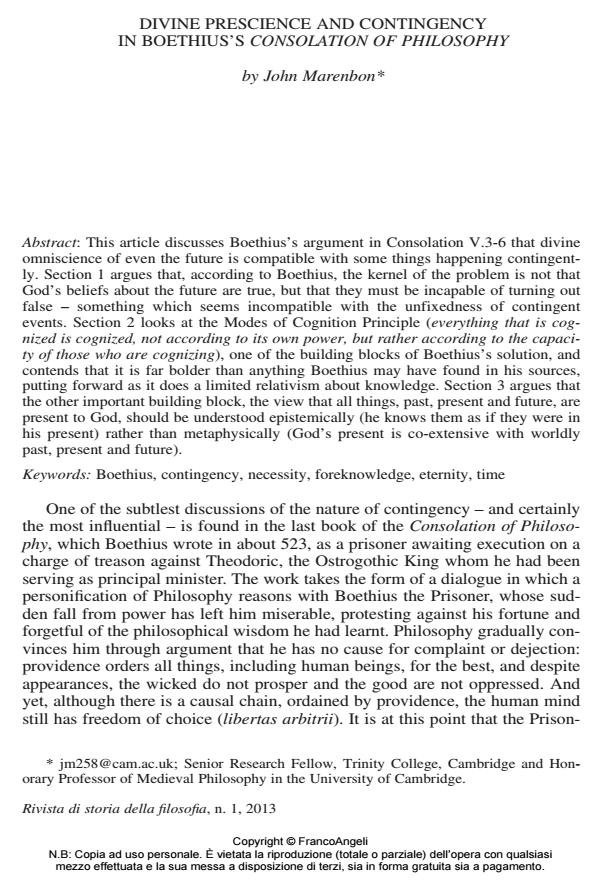Divine prescience and contingency in Boethius’s Consolation of philosophy
Journal title RIVISTA DI STORIA DELLA FILOSOFIA
Author/s John Marenbon
Publishing Year 2013 Issue 2013/1
Language Italian Pages 13 P. 9-21 File size 482 KB
DOI 10.3280/SF2013-001002
DOI is like a bar code for intellectual property: to have more infomation
click here
Below, you can see the article first page
If you want to buy this article in PDF format, you can do it, following the instructions to buy download credits

FrancoAngeli is member of Publishers International Linking Association, Inc (PILA), a not-for-profit association which run the CrossRef service enabling links to and from online scholarly content.
This article discusses Boethius’s argument in Consolation V.3-6 that divine omniscience of even the future is compatible with some things happening contingently. Section 1 argues that, according to Boethius, the kernel of the problem is not that God’s beliefs about the future are true, but that they must be incapable of turning out false - something which seems incompatible with the unfixedness of contingent events. Section 2 looks at the Modes of Cognition Principle (everything that is cognized is cognized, not according to its own power, but rather according to the capacity of those who are cognizing), one of the building blocks of Boethius’s solution, and contends that it is far bolder than anything Boethius may have found in his sources, putting forward as it does a limited relativism about knowledge. Section 3 argues that the other important building block, the view that all things, past, present and future, are present to God, should be understood epistemically (he knows them as if they were in his present) rather than metaphysically (God’s present is co-extensive with worldly past, present and future).
Keywords: Boethius, contingency, necessity, foreknowledge, eternity, time
- Sorabji 1980: Richard Sorabji¸ Necessity, Cause, and Blame. Perspectives on Aristotle’s Theory, Duckworth, London 1980
- Sorabji 2006: Richard Sorabji, Time, Creation and the Continuum. Theories in Antiquity and the Early Middle Ages, University of Chicago Press, Chicago 2006
- Sorabji 2006: Richard Sorabji, Time, Creation and the Continuum. Theories in Antiquity and the Early Middle Ages, University of Chicago Press, Chicago 2006
- Stump/Kretzmann 1981: Eleanore Stump and Norman Kretzmann, Eternity, «Journal of Philosophy» 78 (1981), pp. 429-458.
- Swinburne 1993: Richard Swinburne, The Coherence of Theism, Oxford University Press, Oxford 1993
- Weidemann 1998: Hans Weidemann, Die Unterscheidung zwischen einfacher und bedingter Notwendigkeit in der Philosophiae Consolatio des Boethius in Albert Newen and Uwe Meixner (Hrsg.), Philosophiegeschichte und logische Analyse, Schöningh (Philosophiegeschichte im Überblick 1), Paderborn 1998
- Zagzebski 2011: Linda Zagzebski, Foreknowledge and Free Will, E.N. Zalta (ed.), «The Stanford Encyclopedia of Philosophy» (Fall 2011 Edition), URL = http://plato.stanford.edu/archives/fall2011/entries/free-will-foreknowledge/, Section 1.
- Ammonius 1897: Ammonius, Commentary on De Interpretatione in Adolf Busse (Hrsg.), Commentaria in Aristotelem Graeca IV.5, Reimer, Berlin 1897.
- Ammonius 1998: Id., On Aristotle On Interpretation 9 with Boethius, transl. David Blank and Norman Kretzmann, Duckworth, London 1998
- Beets 2003: François Beets, Boèce et la sémantique du regard in Alain Galonnier (éd.), Boèce ou la chaîne des savoirs, éditions de l’Institut Supérieur de Philosophie and Peeters, (Philosophes médiévaux 44), Louvain-la-Neuve and Paris 2003 , pp. 547 – 569.
- Boethius 1880: Boethius, Commentarii in librum Aristotelis Peri Hermeneias pars posterior, Hrsg. Carl Meiser, Teubner, Leipzig 1880
- Boethius 1906: Id., Commentary on Isagoge, IIa editio, Hrsg. Samuel Brandt, Tempsky and Freytag, (Corpus scriptorum ecclesiasticorum latinorum 48), Vienna and Leipzig 1906
- Boethius 2000: Id., De Consolatione Philosophiae, Opuscula Philosophica, Hrsg. Claudio Moreschini, Teubner, Munich and Leipzig 2000.
- Evans 2004: Jonathan Evans, Boethius on Modality and Future Contingents, «American Philosophical Quarterly» 78 (2004), pp. 247-271.
- Finance 1956: Joseph de Finance, La présence des choses à l’éternité d’après les scolastiques, «Archives de philosophie» 19 (1956), pp. 24-62
- Galonnier 2003: Alain Galonnier, Boèce et la connaissance divine des futurs contingents, in Alain Galonnier (éd.), Boèce ou la chaîne des savoirs, éditions de l’Institut Supérieur de Philosophie and Peeters, (Philosophes médiévaux 44), Louvain-la-Neuve and Paris 2003 , pp. 571-597.
- Hoenen 1993: Maarten J.F.M. Hoenen, Marsilius of Inghen. Divine knowledge in late medieval thought, Brill, (Studies in Christian Thought 1), Leiden, New York and Cologne 1993, pp. 166-175.
- Huber 1976: Peter Huber, Die Vereinbarkeit von göttlicher Vorsehung und menschlicher Freiheit in der Consolatio Philosophiae des Boethius, Juris, Zurich 1976
- Kenny 1979: Anthony Kenny, The God of the Philosophers, Oxford University Press, Oxford 1979.
- Leftow 1991: Brian Leftow, Time and Eternity, Ithaca and London; Cornell University Press 1991
- Marenbon 2003a: John Marenbon, Boethius, Oxford University Press, New York 2003
- Marenbon 2003b: Id., Le temps, la prescience et le déterminisme dans la Consolation de Philosophie de Boèce in Alain Galonnier (éd.), Boèce ou la chaîne des savoirs, éditions de l’Institut Supérieur de Philosophie and Peeters, (Philosophes médiévaux 44), Louvain-la- Neuve and Paris 2003, pp. 531-546
- Marenbon 2005: Id., Le Temps, l’éternité et la prescience de Boèce à Thomas d’Aquin, Vrin, Paris 2005.
- Marenbon 2009a: Id. (ed.), The Cambridge Companion to Boethius, Cambridge University Press, Cambridge 2009
- Marenbon 2009b: Id., Boethius in Graham Oppy and Nick Trakakis (eds.), The History of Western Philosophy of Religion, I, Acumen, Durham 2009, pp. 19-31.
- Martin 1991: Christopher Martin, Boethius and the Logic of Negation, «Phronesis» 36, 1991, pp. 277-304
- Martin 2009: Id., The Logical Textboks and their Influence in John Marenbon (ed.), The Cambridge Companion to Boethius, Cambridge University Press, Cambridge 2009, pp. 56- 84.
- Proclus 2007: Proclus, On Providence, ed. Carlos Steel, Duckworth, London 2007.
- Sharples 2009: Robert J. Sharples, Fate, prescience and free will in John Marenbon (ed.), The Cambridge Companion to Boethius, Cambridge University Press, Cambridge 2009, pp. 207-227
- Boethian Abolition Seeta Chaganti, in PMLA/Publications of the Modern Language Association of America /2022 pp.144
DOI: 10.1632/S0030812921000870
John Marenbon, Divine prescience and contingency in Boethius’s Consolation of philosophy in "RIVISTA DI STORIA DELLA FILOSOFIA" 1/2013, pp 9-21, DOI: 10.3280/SF2013-001002